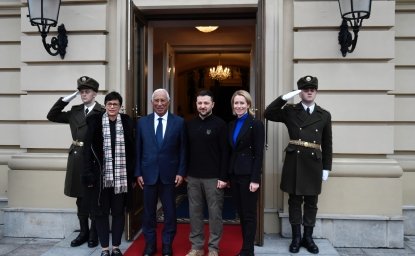This weekend’s quick, unattributed confirmation from the White House that Syrian forces likely used chemical weapons last week strongly suggests that U.S. President Barack Obama is moving quickly on reaching a decision about how to respond — no more slowwalking a judgment about whether Syrian dictator Bashar al-Assad did or didn’t do the deed.
But Obama, who for two years has willfully and wisely avoided militarizing the U.S. role in Syria, hasn’t all of a sudden become a Syria hawk.
Unless rescued by some last minute Syrian mea culpa (e.g., “rogue units did it”) orchestrated by the Russians, who fear western military involvement, more than likely, he’ll look for a military response that splits the difference between doing nothing on the one hand and using the chemical-weapons issue to change the battlefield balance against the regime on the other. Most likely that middle-ground response will be targeted attacks against Syrian military units associated with chemical-weapons capacity and infrastructure. But those could be quite punishing and comprehensive. Better to look strong than weak.
Here’s why I think the president will act:
A response is a must: So far, Obama has been the Avoider-in-Chief when it comes to Syria. But the latest use of chemicals by Assad — perhaps their most extensive deployment since Saddam Hussein killed thousands of Kurds in Halabja – mandates a response, no matter how ineffective or risky it proves to be.
Obama’s credibility is already low. It would be nonexistent without some sort of action, and would badly damage his capacity to be taken seriously in the Middle East. Entering what could be a decisive period of diplomacy with Iran on the nuclear issue, the United States will need to create the perception that it is prepared to use force if diplomacy fails, and to enforce red lines that have already turned pink in the case of Syria.
Lessons of Iraq and Afghanistan: Boots on the ground in Syria are neither the answer nor the danger in the president’s mind. The real lesson to be learned from the two longest wars in U.S. history is the importance of getting means and ends right. And that means making sure that any military response is calibrated to what you want to achieve and what you want to avoid. And Obama knows that U.S. military action is designed to effect a political end. Given his low expectations on what the United States can do to actually end the civil war in Syria, he’ll be very sober about what can be accomplished through any discrete military action.
Changing Assad’s behavior or the regime? Some might argue that the U.S. response can’t be confined as a one-off to retaliate for the recent chemical attack or to warn Assad that there will be a cost for another. Sooner or later, Assad will commit another horror. So the goal must be broader – to begin to change the military balance on the ground.
I’m not sure the president is there yet. Given the deep division and extremism within rebel ranks, the costs and consequences of deeper and broader military action carry much greater risk and uncertainty than a single retaliatory attack that strives to make a point rather than a difference. But the danger of course is that the initial response proves ineffective and the United States is compelled to do more.
Syria is a trap: The president’s recent interview with CNN made pretty clear that he doesn’t see Syria as an opportunity, but as a trap that can easily suck in America and create a situation where he gets stuck with the check.
This bottom line will inform almost everything the president does on Syria, and rightly so. Obama isn’t entranced by the Syrian rebels — his isn’t a transformative, hopeful view, but a much narrower, realistic, and transactional one. It follows his diminishing expectations for the future of the entire Arab Spring, and explains his aversion to risk in Egypt too. What drives Obama in the Middle East is a conviction that there are real limits to what the United States can accomplish in this region.
Iran the real concern: There’s another factor driving Obama’s caution on Syria, and that’s Iran, where he’s drawn his other redline — this time not on the large-scale use of chemical weapons but on Iran possessing a nuclear weapon. The conventional wisdom that bringing down Assad will weaken Iran may be true enough. But it can weaken the United States too if it gets drawn into a proxy war with Tehran in Syria, a game the Iranians play much better than we do.
In fact, the argument can be made that should Assad fall, it will only accelerate Iran’s desire for a nuke as its sense of siege and Sunni encirclement grows. Assuming Obama keeps his use of force in Syria within strict limits, it’s the Iran nuclear issue that represents the real gamechanger, not Syria. Better to keep his options open, then, and not get bogged down in Syria or wrestle with the Russians over Assad’s fate where they won’t give much. He may need them for diplomacy and pressure if there’s an end game coming with the mullahs.
Obama will act militarily in Syria, but deliberately. Whatever its misgivings, the U.S. military will execute whatever attack the president authorizes – maybe missile strikes against units that have used chemical weapons, or against other military infrastructure. And if he explains his reasoning clearly and transparently, he’ll have Congress and the public behind him.
The president’s real problem isn’t stateside; it’s the challenge that all great powers face in dealing with small tribes in unfamiliar neighborhoods who feel their existence is on the line. They may well react in unpredictable ways.
Assad’s options aren’t great. He couldn’t respond to Israeli strikes. What can he do against the mighty United States? Hezbollah might use rockets against Israel. But all of this is just going to make Assad’s situation more precarious. And he’d be foolish to tempt fate by using chemical weapons quickly again. But sooner or later, Assad will again defy the United States and challenge Obama to do something about it. And then the president, having broken the ceiling of using military force directly, will be under pressure to do so again. Only this time, he may need to act more decisively.
And then, well … your move, Obama.
This article originally appeared on Politico.





